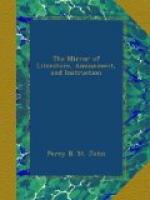To me be Nature’s volume broad display’d;
And to peruse its all instructive page,
* * * * *
My sole delight; as through the falling
glooms
Pensive I stray, or with the rising dawn
On Fancy’s eagle wing excursive
soar;
—and starting from our metropolis, we love to watch the ebbing of population, the dwindling from groves of chimneys and worlds of bricks and mortar to tricksy cottages marshalled with the plumb-line, or sprinkled over “farmy fields” facing Macadamized roads, and collecting more dust in one month than would have ransomed all the captive kings of history, sacred or profane. There we love to trace the ramifications of art from the steam and gas chimneys of the metropolis to the quiet dell, in whose seclusion you might imagine yourself a hundred miles from town, were it not for the hum of the great tun that is fretting and working at a distance. On the road you enjoy scenes that are to be found in no printed book. Nay, every sign-board is a study. Those near the town would do honour to the President’s pencil; as you advance, they retrograde—and as Art declines, Nature smiles still sweeter and softer in never-ending successions of woods and groves, hills and dales, glassy lakes and pebbly streams, with all the variegated charms of rustic life.
But we are getting too rural; for our “Suburban Stroll” extended but to Dulwich and back, about four miles south of London. Twenty years since, we remember, the parish of Camberwell (which includes Peckham and Dulwich) was a pleasant village, with several mansions inhabited by citizens of property, who retired hither for air and recreation; now the whole district is crowded with lath and plaster cottages, and sugar-bakers’ boxes, which appear well adapted for twelfth-cake kings and queens.[7] Twenty years ago, we enjoyed the embowered walk of Camberwell Grove, and above all, Grove Hill, the retreat of Dr. John Coakley Lettsom, till his benevolence overmuch obliged him to part with this delightful residence. Well do we remember the picturesque effect of Grove Hill, the unostentatious, casino-like villa, ornamented with classic figures of Liberality, Plenty, and Flora—and the sheet of water whose surface was broken by a stream from a dank and moss-crusted fountain in its centre. Then, the high, overarching grove, and its summit, traditionally said to be the spot where George Barnwell murdered his uncle, the incident that gave rise to Lillo’s pathetic tragedy. But the march of improvement has extended hither—the walk can scarcely be traced: still there is abundance of timber, for the grove has disappeared, and scores of new houses have sprung up with almost magical effect—and the whole scene reminds us of one of the change-scenes of a pantomime. The builder’s share has turned over nearly every inch of the ground, and fresh gravel and loose loam remind the philosophical pedestrian that all is change beneath as well as on




